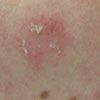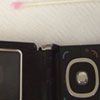- Clinical Technology
- Adult Immunization
- Hepatology
- Pediatric Immunization
- Screening
- Psychiatry
- Allergy
- Women's Health
- Cardiology
- Pediatrics
- Dermatology
- Endocrinology
- Pain Management
- Gastroenterology
- Infectious Disease
- Obesity Medicine
- Rheumatology
- Nephrology
- Neurology
- Pulmonology
Nickel Dermatitis
An 18-year-old girl presented with a red, scaly rash on her cheeks that had been scabbing over, peeling, and draining. She had had similar reactions to earrings and inexpensive jewelry. The appearance of the rash coincided with the use of a new cell phone.
Click to Enlarge

Click to Enlarge

Click to Enlarge
An 18-year-old girl presented with a red, scaly rash on her cheeks that had been scabbing over, peeling, and draining. She had had similar reactions to earrings and inexpensive jewelry. The appearance of the rash coincided with the use of a new cell phone.
An allergy to nickel on the cell phone was suspected. A dimethylglyoxime test (Allertest Ni) was performed in which 2 solutions were applied to a cotton swab that was then rubbed over the metal area of the phone. The swab turned pink, confirming the presence of nickel. Results of patch tests applied to the patient's back showed a strong positive reaction to nickel.
Nickel dermatitis is the most common form of contact dermatitis and has been linked to cell phone use.1 Nickel dermatitis associated with cell phone use should be included in the differential diagnosis of unusual facial rashes. This is true even if the cell phone was not recently purchased, because nickel allergies can take time to develop. Allergic reactions to nickel are easily prevented. For example, patients can use a barrier between the skin and the allergen, wear stainless steel earrings, or paint clear fingernail polish on keys. If it is an occupational exposure (eg, nickel in an industrial compound), rubber gloves may be ineffective; in this case, heavy-duty vinyl gloves may be used.
This patient was treated with triamcinolone ointment, and the rash resolved within a week. She purchased a new cell phone, and no further rashes occurred.
References:
REFERENCE:
1. Luo J, Bercovitch L. Cellphone contact dermatitis with nickel allergy [published correction appears in CMAJ. 2008;178:440]. CMAJ. 2008;178:23-24.
Atopic Dermatitis: The Pipeline and Clinical Approaches That Could Transform the Standard of Care
September 24th 2025Patient Care tapped the rich trove of research and expert perspectives from the Revolutionizing Atopic Dermatitis 2025 conference to create a snapshot of the AD care of the future.
